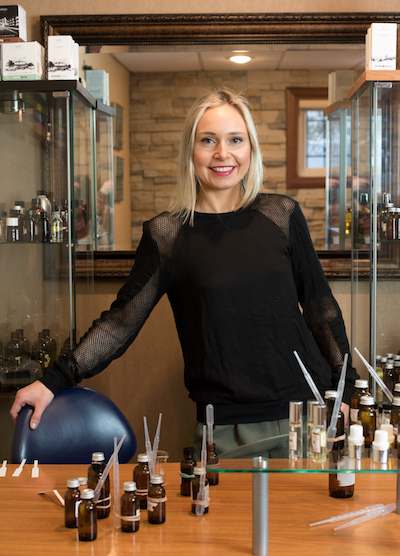When Agnieszka Burnett escaped Communist Poland in the late 1980s, she had no idea that experience would inspire her life’s work. After all, she was only a baby.
She describes her parents as “risk takers” who had “all these dreams they didn’t see to be feasible at that time”—dreams relating to better opportunities for their children and their family as a whole.
Burnett’s parents were doctors and came to the U.S. to obtain new medical licenses. They went on to start their own medical practices, sparking the desire in their daughter to own her own business one day.

While Burnett was introduced to entrepreneurship early on through her parents, it took her a little while to experience it firsthand.
During college, she took the journalism route, always knowing that she would end up in fashion and beauty someday. She made her own fashion, beauty, and travel magazine called Agnieszka’s Style and Travel Magazine and sent it to all of her friends via snail mail. It featured drawings and layouts of clothing, beauty products, and articles about her travels to Europe most summers. Often 20 pages long, Burnett says it looked “just like a real magazine, but I hand-drew and handwrote everything.”
She soon became an intern at Glamour magazine. While fellow interns stepped out for lunch, Burnett would help out in the beauty closet. This unmatched work ethic landed her a permanent gig; just as she was about to graduate from college, Glamour’s current beauty assistant of almost four years was leaving, and Burnett pleaded her case.
She became a cosmetics and fragrances expert, crediting her boss at the time with instilling in her a love of fragrance and knowledge of the industry.

After Glamour, Burnett studied chemistry at Columbia University. She picked up a few books on perfumery and took a trip to a now-defunct scent store in the East Village to buy vials of oils so that she could learn to discern individual smells. As she ordered more, she began mixing the scents in her apartment. From there, she says, “I was hooked!”
About a year later, she and her husband Benjamin started their travel-inspired fragrance business: Nomaterra.
“I love the idea and ability to combine science married to romance, beauty, and aesthetics,” she says of working in perfumery.
When the New York-based WeWork member started Nomaterra, no one else was doing similar work: creating fragrances based on locations and trying to tap into what’s unique and authentic about those specific places—like the culture or local spices. In fact, the duo pulls from over 3,000 different ingredients in their lab to create scents inspired by different locations throughout the world.

For example, a recent trip to New Orleans inspired fragrances that use whiskey and other alcohols, but also patchouli and myrrh because of the long tradition of voodoo practice in the region. As for the Cape Cod scent, “The crispness and freshness is undeniable,” she says. “It feels exactly like the fresh, chilly breeze Ben and I experienced while moped-ing around Cape Cod and Martha’s Vineyard.” This scent is inspired by the salt of the ocean, the wild beach roses blowing near sand dunes, and the lavender farm located on a hidden dirt road.
The Burnetts continue to travel the world, looking for new and interesting places that inspire their work, which brings to mind the company’s fascinating etymology: “noma” (nomad) and “terra” (“of the land”).
The pair will often “search far and wide to find some very rare ingredients,” Burnett says. Gardenias, for instance, require thousands of petals to extract a small amount of fragrance. “So that’s the process: foraging for these ingredients and making an authentic representation of them.”

Though it all sounds like smooth sailing now, Burnett recalls how difficult it was to hear “no,” or to be let down when she didn’t get business deals or opportunities she had worked hard for. But she also talks about how those letdowns helped her reevaluate the direction she wanted to go.
When asked for some advice she’d share with other entrepreneurs, she dishes out a motto she still lives by to this day: “A ‘no’ doesn’t really mean a ‘no,’” says Burnett. “It’s a temporary no, and it can always lead to a yes, as long as you’re persistent. Be relentlessly persistent.”
Photos: Nomaterra




